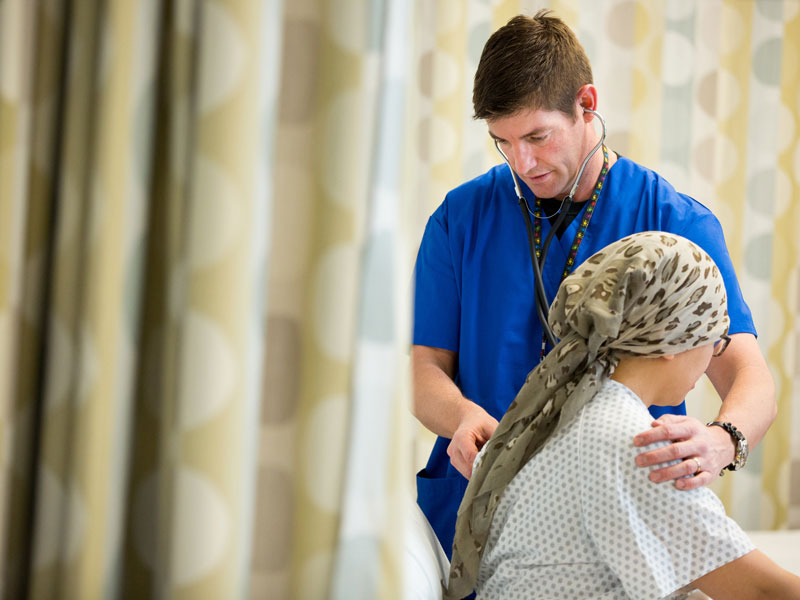Psychological Distress Affects Caregivers but Not Patient Symptoms in Head and Neck Cancer
Psychological stress in caregivers of patients with head and neck cancer (HNC) may impair the quality of patient care they provide and affect outcomes such as survival. However, patient symptom burden and caregiver tasks and their impact on psychological stress is not well understood.
- Read more about Psychological Distress Affects Caregivers but Not Patient Symptoms in Head and Neck Cancer
- Add new comment
Using the Web for Oncology Training Curriculum
Internet and web-based programs are becoming increasingly important resources in career training, including for oncology nursing. However, training in supportive oncology can still pose challenges. Researchers studied how institutions used web-based oncology training for healthcare professionals (HCPs) and presented their findings on Monday, June 4, at the 2018 American Society of Clinical Oncology Annual Meeting.
HHS Pain Task Force Examines Opioid Epidemic Impact on Patients, Providers

The Department of Health and Human Services (HHS) Pain Management Best Practices Inter-Agency Task Force held its first public meeting from May 30–31, 2018, in Washington, DC. Convened as part of 2016’s Comprehensive Addiction and Recovery Act, the task force has been charged to address the nation’s continued opioid abuse crisis. During the two-day meeting, the 28-member task force deliberated on the goals of an upcoming study, set to be released July 2019, that aims to update best practices and clinical guidelines, while also addressing gaps and inconsistencies in chronic and acute pain management.
- Read more about HHS Pain Task Force Examines Opioid Epidemic Impact on Patients, Providers
- Add new comment
Health Policy Advances Cancer Treatment Options in the Era of Biosimilars

Options and cost are a double-edged sword as biomedical research marches forward and the list of approved drugs expands. More targeted drugs for specific diseases means that more patients have treatment plans that can directly fight their specific disease, possibly resulting in cures.
- Read more about Health Policy Advances Cancer Treatment Options in the Era of Biosimilars
- Add new comment
Study Investigates How Health Literacy Affects Adherence to Oral Cancer Medications
Ensuring patients adhere to oral medications for cancer can be a complex task, especially if patients have low health literacy. Oral medications for cancer continue to be more prevalent, but rates of adherence to oral therapy vary widely by population, cancer type, and level of education. At the 2018 American Society of Clinical Oncology Annual Meeting, researchers presented the results of a study that hypothesized health literacy’s connection to oral medication adherence and whether a multilevel intervention approach would result in greater adherence.
- Read more about Study Investigates How Health Literacy Affects Adherence to Oral Cancer Medications
- Add new comment
Team-Based Professional Development Improves Knowledge Gap for Oncology Geriatric Care
Oncology nurses often work with older patients with cancer, but knowledge gaps in training can remain. To combat this issue, researchers implemented an educational curriculum in geriatric care for oncology nurses and presented the results of that training at the 2018 American Society of Clinical Oncology Annual Meeting.
- Read more about Team-Based Professional Development Improves Knowledge Gap for Oncology Geriatric Care
- Add new comment
Researchers Clarify Connection Between Night Shift Work Duration and the Risk of Colorectal Cancer
Evidence already supports a connection between night shift work and an increased risk of colorectal cancer (CRC), but the mechanism has been difficult to pinpoint. In a study presented at the 2018 American Society of Clinical Oncology Annual Meeting, researchers evaluated the insulin receptor substrate (IRS) 1 and 2 proteins and presented the role they play in the connection of night shift work and CRC.
- Read more about Researchers Clarify Connection Between Night Shift Work Duration and the Risk of Colorectal Cancer
- Add new comment
Study Gives a Better Understanding of ARID1A Mutations in Colorectal Cancer
A component of the SWI/SNF chromatin remodeling complex, AT-rich interactive domain 1A (ARID1A), regulates gene expression. Data on the characteristics and associated clinicopathologic features of ARID1A in colorectal cancer (CRC) are limited, even though its mutations are reported in a variety of other cancers. In study findings presented at the 2018 American Society of Clinical Oncology Annual Meeting, researchers explained an increased understanding of the ARID1A mutation in CRC.
- Read more about Study Gives a Better Understanding of ARID1A Mutations in Colorectal Cancer
- Add new comment
Early Oncology Care Model Data Show Reduced Hospital Admissions
Improving quality and reducing costs in a practice are two of the Oncology Care Model’s (OCM) key goals, and one of the best ways to achieve them is to reduce unnecessary emergency department (ED) visits and hospitalizations. During a study presented at the 2018 American Society of Clinical Oncology Annual Meeting, researchers described a campaign implemented to reach those objectives.
Patients Report More Satisfaction With Multidisciplinary Care Versus Serial Care for Lung Cancer
Despite the prevalence of multidisciplinary (MD) care for cancer, rigorous studies comparing it to serial care (SC) are lacking. To address the literature gap, researchers explored the use of MD versus SC for lung cancer and presented the findings at the 2018 American Society of Clinical Oncology Annual Meeting.





